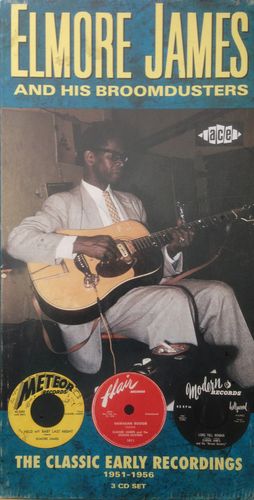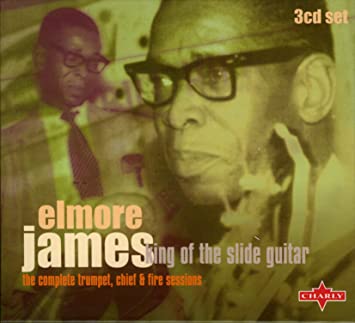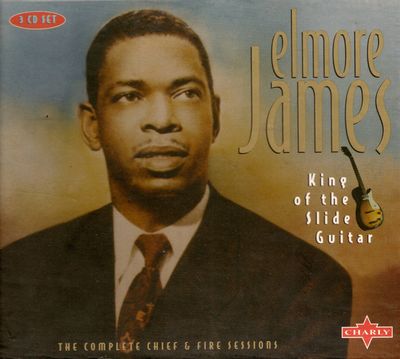Elmore Brooks
b. January 27th, 1918 in Richland (Mississippi)
d. May 24th, 1963 in Chicago (Illinois)

CLASSIC EARLY RECORDINGS
Ace
P-Vine
August 1951 - January 1956
Fils de Leola Brooks et de Joe Willie James, le jeune Elmore montre rapidement un vif interêt pour la musique (il se confectionne des guitares rudimentaires). La famille habite successivement à Canton puis à Belzoni. Avec son demi-frère Robert Earl Holston, il joue dans les juke-joints et rencontre Robert Johnson et Sonny Boy Williamson. Enrôlé dans l'armée entre juillet 1943 et novembre 1945, il sert notamment dans le Pacifique. De retour à la vie civile, Elmore s'associe souvent avec Sonny Boy Williamson et connait ses premiers ennuis cardiaques. Grâce à Williamson, Elmore est présenté à Lillian Mac Murry en janvier 1951 qui dirige le label Trumpet. Il y accompagne son ami harmoniciste mais trouve aussi l'opportunité de graver son premier morceau : "Dust my broom". Ce superbe morceau - qui avait été enregistré par Robert Johnson - obtint un grand succès. Attirés par ce bluesman prometteur, Joe Bihari et son talent-scout Ike Turner enregistrent Elmore dès janvier 1952 pour les labels Modern et Flair : "Please find my baby", "Hawaiian boogie", "Lost woman blues". Pour Meteor - autre label des frères Bihari - il grave plusieurs chefs d'oeuvre à Chicago : "I believe", "I held my baby last night", "Baby what's wrong". Elmore, impérial à la slide guitare, est accompagné de J.T. Brown (saxophone), Johnny Jones (piano), Ransom Knowling (basse) et Odie Payne (batterie). Il poursuit avec "Early in the morning", "Can't stop lovin'", "Where can my baby be", "Canton Mississippi breakdown", "Wild about you baby". Puis à Los Angeles, il participe à une séance plus orientée Rhythm & Blues avec Maxwell Davis : "Standing at the crossroads", "Late hours at midnight", "Sunny land". Peu après, il y aura aussi une séance à la Nouvelle Orléans dans le studio de Cosimo Matassa qui débouche sur "Dust my blues", "I was a fool", "Blues before sunrise". Elmore collabore avec les frères Bihari jusqu'en janvier 1956.
Son of Leola Brooks and Joe Willie James, young Elmore quickly showed a keen interest in music (he built homemade guitars). The family lived successively in Canton then in Belzoni. With his half-brother Robert Earl Holston, he plays in juke-joints and meets Robert Johnson and Sonny Boy Williamson. Enlisted in the army between july 1943 and november 1945, he served notably in the Pacific. Returning to civilian life, Elmore often teamed up with Sonny Boy Williamson and knew his first heart trouble. Thanks to Williamson, Elmore was introduced to Lillian Mac Murry in january 1951 who ran the Trumpet label. He accompanies his harmonica friend there but also finds the opportunity to cut his first track : "Dust my broom". This superb piece - which had been recorded by Robert Johnson - was a great success. Attracted by this promising bluesman, Joe Bihari and his talent-scout Ike Turner recorded Elmore in january 1952 for the Modern and Flair labels : "Please find my baby", "Hawaiian boogie", "Lost woman blues". For Meteor - another label of the Bihari brothers - he recorded several masterpieces in Chicago : "I believe", "I held my baby last night", "Baby what's wrong". Elmore, imperial on slide guitar, is accompanied by J.T. Brown (saxophone), Johnny Jones (piano), Ransom Knowling (bass) and Odie Payne (drums). He continues with "Early in the morning", "Can't stop lovin'", "Where can my baby be", "Canton Mississippi breakdown", "Wild about you baby". Then in Los Angeles, he participated in a more Rhythm & Blues oriented session with Maxwell Davis : "Standing at the crossroads", "Late hours at midnight", "Sunny land". Shortly after, there will also be a session in New Orleans at Cosimo Matassa's studio which leads to "Dust my blues", "I was a fool", "Blues before sunrise". Elmore worked with the Bihari brothers until january 1956.


KING OF SLIDE GUITAR
Charly
January 1953 - February 1963
Elmore fit quelques infidélités aux frères Bihari en gravant cinq morceaux pour Chess-Checker dont "She just won't do right" et "Whose muddy shoes". En avril 1960, il revient chez Chess avec le remarquable "The sun is shining". Il entama une belle collaboration avec le label Chief de Mel London dont la plupart des titres seront rachetés par Vee-Jay. Sur ces excellents morceaux, Elmore est supporté par Wayne Bennett, Eddie Taylor, Homesick James : "The twelve years old boy", "It hurts me too", "Knocking at your door". A partir de 1959, il travaille pour les labels Fire et Enjoy du producteur Bobby Robinson qui relance sa carrière. Cette fructueuse collaboration (jusqu'à sa mort) va déboucher sur des pièces parfaitement abouties - gravées avec son groupe régulier - qui comptent parmi ses meilleures : "The sky is crying", "Baby please set a date", "Rollin' and tumblin'", "Anna Lee", "Look on yonder wall" (avec Sam Myers à l'harmonica), "Shake your moneymaker". Sur ces titres s'épanouissent son chant hargneux et son jeu inventif et toujours excitant au bottleneck. Malheureusement, sa santé fragile se dégrade de plus en plus et il décède d'un arrêt cardiaque en mai 1963. Son influence fut décisive sur John Littlejohn, Hound Dog Taylor ou Lil' Ed Williams.
Elmore did some infidelity to the Bihari brothers by engraving five tracks for Chess-Checker including "She just won't do right" and "Whose muddy shoes". In april 1960, he returned at Chess with the remarkable "The sun is shining". He began a great collaboration with Mel London's Chief label, most of whose titles will be bought by Vee-Jay. On these excellent songs, Elmore is supported by Wayne Bennett, Eddie Taylor, Homesick James : "The twelve years old boy", "It hurts me too", "Knocking at your door". From 1959, he works for the Fire and Enjoy labels of producer Bobby Robinson who is relaunching his career. This fruitful collaboration (until his death) will lead to perfectly accomplished tracks - engraved with his regular band - which are among his best : "The sky is crying", "Baby please set a date", "Rollin' and tumblin'", "Anna Lee", "Look on yonder wall" (with Sam Myers on harmonica), "Shake your moneymaker". On these tracks flourish his surly song and his inventive and always exciting playing with bottleneck. Unfortunately, his fragile health deteriorated more and more and he died of a cardiac arrest in may 1963. His influence was decisive on John Littlejohn, Hound Dog Taylor or Lil' Ed Williams.